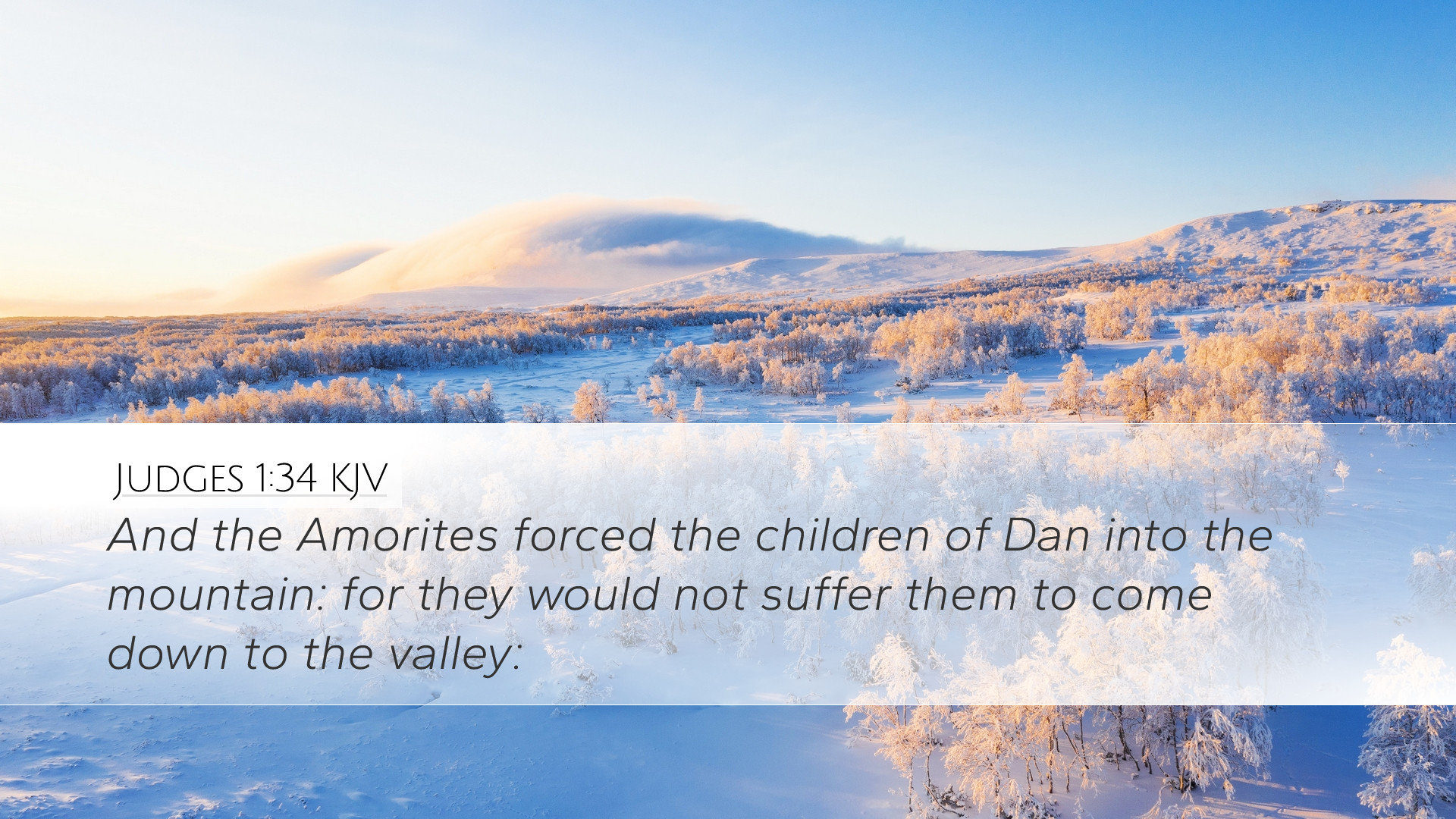Bible Commentary on Judges 1:34
Judges 1:34 (ESV): "The Amorites pressed the people of Dan back into the hill country, for they did not allow them to come down to the plain."
Contextual Overview
This verse is situated within the broader narrative of Israel's conquest and settlement of Canaan. It highlights the struggles faced by the tribe of Dan in their efforts to secure their allotment of land, reflecting a theme of resistance encountered by the Israelites. The Amorites, a formidable foe, exemplify the ongoing conflicts that characterize the early chapters of the Book of Judges.
Insights from Public Domain Commentaries
Matthew Henry's Commentary
Matthew Henry emphasizes the significance of this verse in illustrating the failures of the tribe of Dan. He notes that the Amorites, representing the adversities faced by the Israelites, 'pressed the people of Dan back into the hill country.' This suggests a lack of faith and resolve among the Danites. Henry critiques the tribe's inability to claim the land promised to them and uses this passage to highlight the consequences of disobedience to God's commands.
- Spiritual Lessons: Henry points out that the struggles of the Danites serve as a reminder that failing to seize the spiritual inheritance God has promised can lead to a life of struggle and defeat.
- Geographical Significance: The mention of 'hill country' versus 'plain' symbolizes the spiritual heights and depths that the people encounter as they navigate their faith.
Albert Barnes' Notes on the Bible
Albert Barnes provides a detailed analysis of the implications of the Amorites' dominance over the Danites. He asserts that this oppression signifies not just physical subjugation but also a theological commentary on the spiritual state of Israel at this time. According to Barnes, 'the Amorites pressed the people of Dan,' indicates that the Danites faced this oppression due to either incomplete obedience or lack of faith in God’s might.
- Obedience and Consequences: Barnes stresses that the lack of total obedience to God's commands often results in increased struggles.
- Theological Reflection: The situation of the Danites reflects Israel’s broader struggle against sin and disobedience, pointing to the need for reliance on divine assistance.
Adam Clarke's Commentary
Adam Clarke takes a historical and critical approach, examining the broader implications of the conquest narratives. He observes that the outcomes of the tribal conflicts, particularly in the case of Dan, highlight the complexity of Israel's settlement process. Clarke articulates that the Amorites' control over the plains deprived the Danites of fertile and desirable land, causing them to retreat to less advantageous regions.
- Historical Context: Clarke provides insight into the nature of the Amorite dominance, pointing out that it was a result of both military prowess and the spiritual failings of the Israelites.
- Call to Faithfulness: He interprets this passage as a call for the believers of all ages to remain steadfast in their commitment to God’s commands to avoid similar consequences.
Theological Implications
The struggles of the tribe of Dan as illustrated in Judges 1:34 resonate deeply with various theological themes:
- The Consequences of Sin: The inability of the Danites to secure their promised possession reflects a broader truth about the consequences of disobedience in the life of believers.
- Spiritual Warfare: The conflict with the Amorites symbolizes the spiritual warfare Christians face today as they strive for holiness and obedience to God.
- Promise and Fulfillment: While the verses show a setback, they also point to the overarching promise of God’s faithfulness in fulfilling His covenant, even amid struggle.
Application for Today
In light of Judges 1:34, there are several applications that pastors, students, theologians, and Bible scholars can draw:
- Encouragement in Struggles: Just as the Danites faced setbacks, believers are encouraged to remain faithful amidst difficulty and trust in God’s ultimate victory.
- Reflection on Obedience: This verse serves as a powerful reminder of the importance of obedience to God and the dangers of complacency in one’s faith.
- Unity in the Body of Christ: The conflicts faced by the tribes illustrate the need for unity in the Church, recognizing that struggles can often be collective and not just individual.
Conclusion
Judges 1:34 serves as a poignant reminder of the complexities of faith, obedience, and the reality of spiritual struggle. Through the insights provided by respected public domain commentaries, we gain a multifaceted understanding of not only the historical context but also the theological implications relevant to our lives today. As we reflect on the experiences of the tribe of Dan, we are called to examine our own faith journeys and recognize the importance of relying on God’s promises in the face of adversity.


